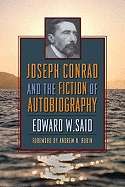Joseph Conrad and the Fiction of Autobiography

Resumen del libro
Edward W. Said locates Joseph Conrad's fear of personal disintegration in his constant re-narration of the past. Using the author's personal letters as a guide to understanding his fiction, Said draws an important parallel between Conrad's view of his own life and the manner and form of his stories. The critic also argues that the author, who set his fiction in exotic locations like East Asia and Africa, projects political dimensions in his work that mirror a colonialist preoccupation with "civilizing" native peoples. Said then suggests that this dimension should be considered when reading all of Western literature. First published in 1966, Said's critique of the Western self's struggle with modernity signaled the beginnings of his groundbreaking work, "Orientalism," and remains a cornerstone of postcolonial studies today.
Biografía del autor
x{0026}lt;P x{0026}lt;B Edward W. Saidx{0026}lt;/B (1935-2003) fue uno de los intelectuales árabes más importantes del siglo XX. Nacido en Jerusalén en una familia palestina, se educó en el Victoria College de El Cairo, en el Mount Hermon School de Massachusetts y en las Universidades de Princeton y Harvard. Fue profesor de literatura inglesa de la Universidad de Columbia desde 1963 hasta su muerte. Además, en 1974 fue profesor visitante de literatura comparada en Harvard; en 1975-76, miembro del Center for Advanced Study in Behavioral Science de Stanford, y en 1979, profesor visitante de humanidades en la Universidad de John Hopkins. Fue director del Arab Studies Quarterly y miembro del Council on Foreign Relations de Nueva York, de la Academy of Literary Studies y del PEN. Entre múltiples premios recibió el Premio Bowdoin de la Universidad de Harvard y el Lionel Trilling Award en 1976, así como el Príncipe de Asturias en el año 2002.x{0026}lt;/P








